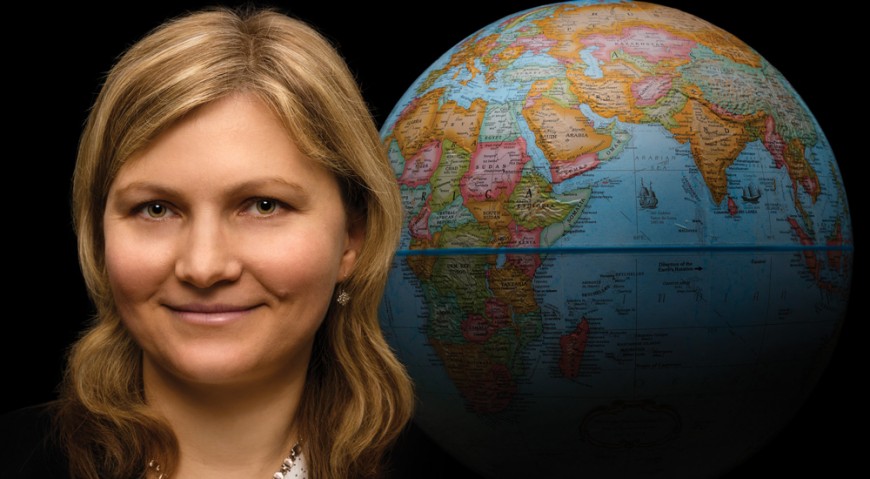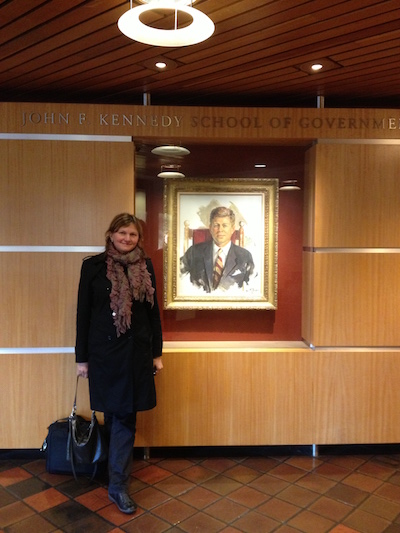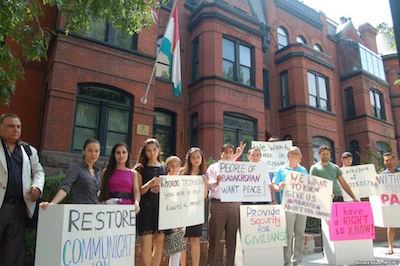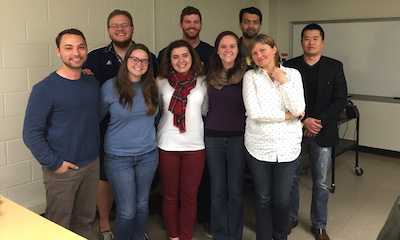
In the aftermath of a violent conflict or natural disaster, economists like Olga Shemyakina are very interested in the data that become available—data that can help them understand the human impact. In her research, she asks: Who stopped their education because of such a shock? Who suffered health consequences? Who migrated? And what do such impacts mean for a country or region’s recovery?
Shemyakina, an associate professor in Georgia Tech's Ivan Allen College School of Economics, studies human capital accumulation, where close examinations of political instability and armed conflict can reveal crucial changes on an individual level. Moving beyond country-level statistics, her research is often a deep dive into the specifics of a region or locality. Shemyakina’s findings, combined with broader studies on development and labor economics, can help illustrate the impacts of war and other disasters on communities, which will ideally lead to better policy implementation in the future.
As part of her work, she also has consulted on conflict, education, and labor markets for the World Bank.
 How did you first become interested in the effects of conflict on individuals?
How did you first become interested in the effects of conflict on individuals?
I grew up in the former Soviet Union, now the Republic of Kazakhstan in Central Asia. At the time of our independence, I realized that things were changing—suddenly our country had a different currency from the rest of the former Soviet Union. There was also an instability in other former Soviet republics. As a young person you don’t exactly understand what’s happening, but you see that systems are changing.
Your research encompasses under-standing how people respond to shocks. What does that mean?
A shock could be a death of a parent or a sibling; loss of assets due to weather events, like a hurricane, tsunami, drought, or flood; or civil war. In my area of research, we analyze large datasets and multiple studies to understand the impact of these shocks. What happens to an individual after that? Does a child whose parent died get more or less education compared to a child from a family that did not experience such a loss?
Given how broad this topic can get, what do you try to understand first?
I normally begin my research by learning about a country I am interested in. I read on the nature of the conflict, get some basic data, and think about various groups of people and the ways in which their lives have been influenced by the war. I also read the relevant literature and identify what’s missing that would be useful to know. In the process, I learn about data sources, variables to measure conflict, its impact, and individuals’ behavioral responses to the conflict. At this point, I also spend a lot of time thinking about how to identify these effects in a causal way. Finally, I run my models, interpret my findings, and discuss what this all means for future policy and knowledge in the area of conflict and economic development.
When I was earning my Ph.D., I learned about a large dataset for Tajikistan on households and individuals that included data on education. The country had a civil war. I wanted to see if children were still going to school or not. Back then, most studies compared country level enrollments over time, to see if they were lower or higher after the conflict. I was more interested in how individual people changed their behavior in response to fighting, bombing, and migration—what happened to their education?
You found that there is a definite connection between a shock, a person’s education or health and how that person will fare over time.
Yes. Education and health are human capital that you accumulate over a lifetime. Usually, the bulk of this accumulation happens when a person is very young. Unexpected changes to one’s environment—a shock—during early childhood may affect their education and health. Poor nutrition and exposure to disease in early childhood has been shown to affect one’s health later in life (depression, obesity) and their earnings.
Is there a difference between the impact of a natural disaster versus that of a war or violent conflict?
They are different. When you have a natural disaster, the government typically engages to help the affected. People work together. If you have a war, there are so many fighting sides that emerge, people lose trust in each other. Once the war ends, it’s hard to regain trust.
 Does that lack of trust impact trade?
Does that lack of trust impact trade?
War makes trade more difficult. When you have armed elements on the road, it’s hard to bring your produce to market. One side may seek retribution. In Tajikistan’s civil war, a truce was signed with the opposition. However, right afterwards, people on the losing side had to hide. If young males from that group traveled to the market, they could be beaten or taken away. The post-war instability can last for a long time.
You look at data throughout Africa, Asia and Europe—are there similarities in the ways communities respond to instability in terms of health?
The impacts on child health are similar in response to conflict, which suggests that biology may play a role. In war-affected areas, we find that children under the age of 5 tend to be stunted, shorter than they should be for their age, likely due to lack of nutrients or disease in early childhood.
How about with the impacts of instability on labor—are there differences by culture or geography?
Sometimes it depends on the culture of a place. One study compared female labor force participation for six war-affected countries. Only in one of these countries, women did not increase their labor force participation during the conflict. In the remaining five, many women joined workforce during the war. Many women may return home after the war ends for various reasons. It could be that men coming back from war need jobs.
 Do your findings impact policy?
Do your findings impact policy?
We are building up knowledge using the experiences of different countries. I would say the biggest challenge is now that we know that conflict has a strong, negative impact on education and health, how do we implement changes that cushion the impact of the shocks?
Research shows that countries with strong health and educational systems are more resilient, and we should focus on building these systems. Also research shows that children whose parents have more education are typically better off. In particular, education of mothers has a big, positive impact on children’s well-being.
What do you hope the contributions of your research will be?
I hope that my research will help countries develop better policies to recognize and address shortfalls in education and health, and gender imbalances created by armed conflict. Additionally, I teach a class titled “Conflict and Security in Developing Countries,” in which we discuss many studies on armed conflict with both economics and non-economics students at Georgia Tech. I hope this informs and influences these students in their future careers.
Originally featured in the Gerogia Tech Alumni Magazine.we
About Olga Shemyakina
Associate Professor, School of Economics
Olga Shemyakina received her Ph.D. in economics from the University of Southern California in 2007, and she joined the School of Economics at the Georgia Institute of Technology in August 2007. Her research interests include applied microeconomics, development economics, labor economcs, armed conflict, health, education, and gender. Dr. Shemyakina's research examines the effects of violent conflict and subsequent instances of protracted economic and political instability on the behavior of households in various geographical and institutional settings. Recent research studies and publications by Dr. Shemyakina have explored the short- and long-term effects of armed conflict on health and education of children, subjective well-being, migration, marriage, and labor market outcomes.
